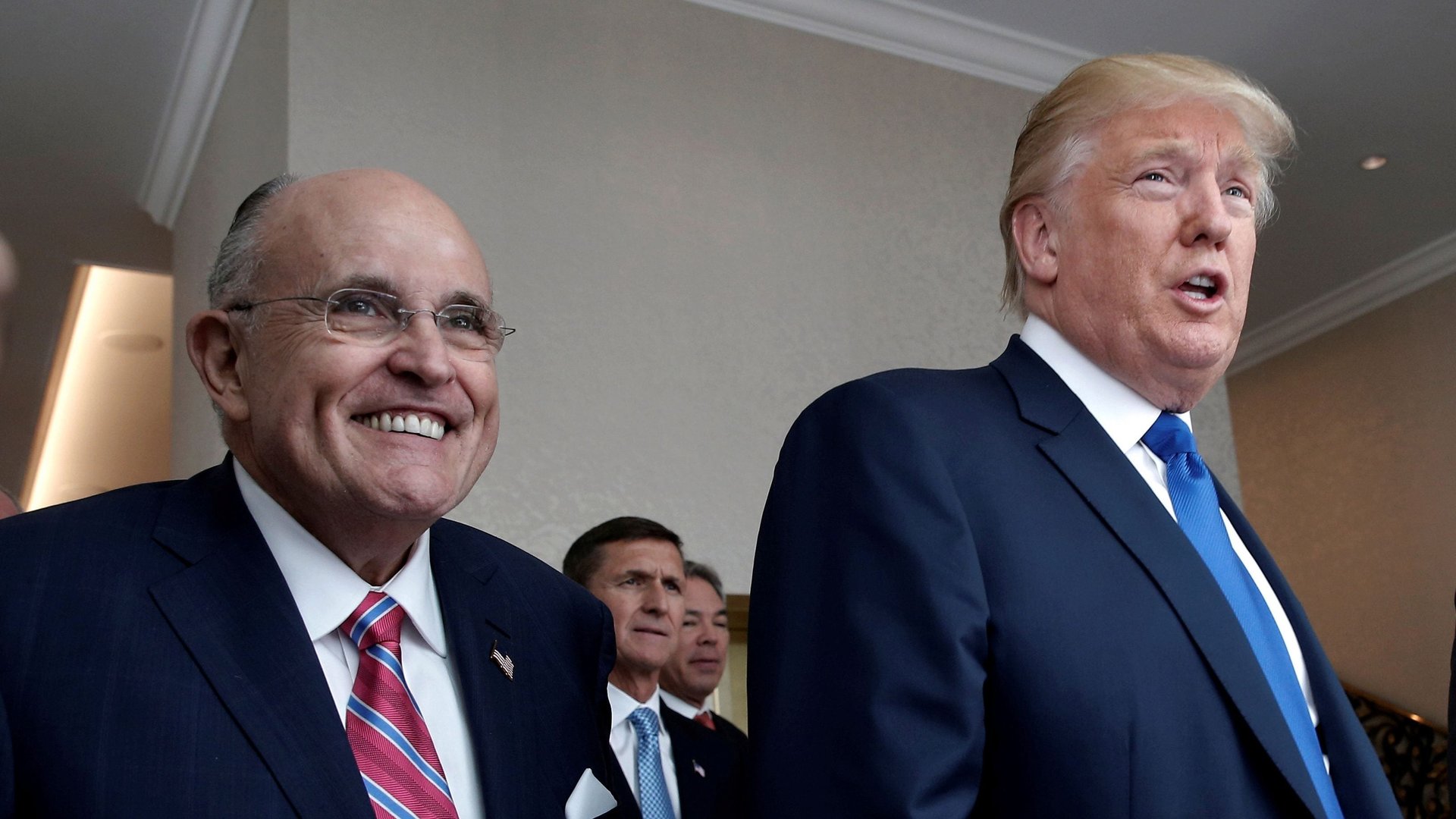Rudy Giuliani’s television blitz suggests two ways that Trump broke the law
Donald Trump advisor and former New York City mayor Rudy Giuliani’s television interview blitz over the past 18 hours suggests the US president may have violated laws about campaign finance or financial disclosures, watchdog groups say.


Donald Trump advisor and former New York City mayor Rudy Giuliani’s television interview blitz over the past 18 hours suggests the US president may have violated laws about campaign finance or financial disclosures, watchdog groups say.
Giuliani made a surprise admission last night (May 2) that Trump knew about a payment his personal lawyer Michael Cohen made to adult film star Stephanie Clifford, also known as Stormy Daniels. In doing so, he contradicted repeated claims by Trump and the White House that they knew nothing about the payment.
An unreported, oversized campaign donation
Cohen’s payments on behalf of Donald Trump during the 2016 presidential campaign should be considered an “unreported in-kind contribution” to candidate Trump, says Common Cause, a watchdog group that filed a lawsuit with the Department of Justice and the Federal Election Commission alleging the Trump campaign broke campaign finance rules. Corporations are prohibited from contributing directly to federal candidates, and individual contributions are limited to $2,700.
On Fox and Friends this morning (May 3), Giuliani appeared to argue that the matter was not campaign-related. “The payment wasn’t for the campaign,” he said. Clifford was alleging a “one-time affair” with Trump, and when “Cohen heard $130,000” he thought the amount was “cheap” to make the allegation go away.
But then Giuliani himself linked the payment motive to Trump’s campaign, saying “Imagine if that came out of October 15, 2016, in the middle of the last debate with Hillary Clinton…,” referencing a date just weeks before the US presidential election. “Cohen made it go away. He did his job.”
The Federal Election Campaign Act, passed in 1971 and amended several times since, “requires candidate committees, party committees, and PACs to file periodic reports disclosing the money they raise and spend,” the FEC explains. That includes identifying individuals who give them more than $200 in an election cycle.
Trump paid Cohen back in installments, Giuliani told Sean Hannity last night, which were “funneled” through a law firm:
Loans do count as campaign contributions, FEC guidelines make clear. If Cohen’s payment is counted as a contribution, that $130,000 total amount was way over the $2,700 individual limit.

Criminal prosecution “can only be brought for ‘knowing and willful’ violations of campaign finance laws,” explains Paul S. Ryan, vice president for policy and litigation at Common Cause.
By saying that Trump knew about the payment to Clifford and repaid Cohen, Giuliani may have put Trump “in legal peril for ‘knowing and willful’ violations of campaign finance law,” Ryan said, because he “handed the DOJ evidence that president Trump committed criminal violations of federal law.”
Trump tried to explain the situation this morning in a series of tweets, alleging that such agreements were “common among celebrities and people of wealth.”
Past violators of campaign finance law have been charged with criminal conspiracy, which carries a maximum five-year prison sentence.
False financial disclosure
Trump’s tweets expose the president to another potential liability—a violation of rules public officials must follow when filing financial disclosures, Walter Shaub, former head of the Office of Government Ethics and current ethics director of the Campaign Legal Center, another watchdog group, noted on Twitter.
“With this latest explanation, president Trump finds himself between something of a rock and a hard place,” Corey Goldstone, spokesman for the Campaign Legal Center, told Quartz. If the payment was a loan from Cohen, as Giuliani claimed, “Trump was required to disclose it in the financial disclosure report that he filed in June 2017 with the Office of Government Ethics,” he said—just as he had to disclose any loan greater than $10,000 at any time during 2016 or the first half of 2017. “He didn’t disclose it and, if the omission was intentional, he could be subject to civil or criminal penalties.”
Breaking those rules carry a maximum penalty of $50,000.
In March, the Citizens for Responsibility and Ethics in Washington (CREW), an election watchdog group, asked the Office of Government Ethics (pdf) to investigate the payment, and filed a criminal complaint with the Department of Justice (pdf) as well. Norm Eisen, chair of CREW, said today that the group had filed a criminal complaint alleging Trump lied on his financial disclosures as well.
What the Federal Election Commission can do
Even if Trump and Cohen appear to have violated campaign finance laws, there’s not likely to be a quick resolution, former FEC commissioner Ann Ravel told Quartz.
The politically gridlocked FEC often takes months, or years, to rule on campaign finance complaints. It is particularly hamstrung right now, because it is down to four commissioners instead of the six it is supposed to have, Ravel said. Despite the January complaint, “I can guarantee you without even knowing, because I’m not on the inside, that the commissioners have not even looked at the issue at all,” he said.
The FEC’s office of general counsel needs to study a complaint before recommending that the commission investigate it, she notes. All four commissioners need to agree on the recommendation, but they’ve been fighting bitterly. “The likelihood of this being expedited is almost impossible,” Ravel said.